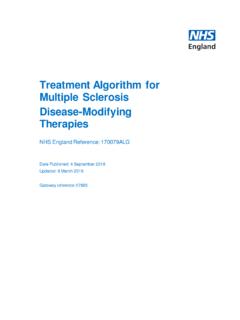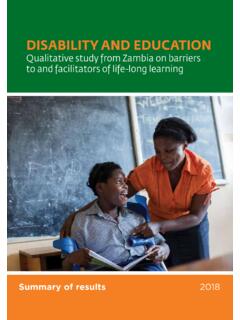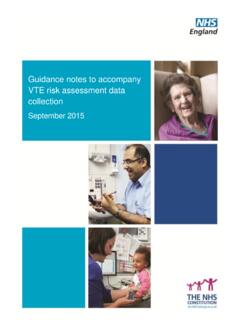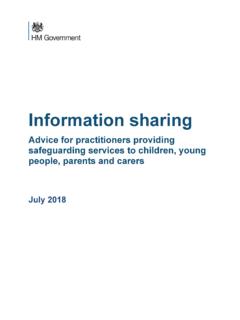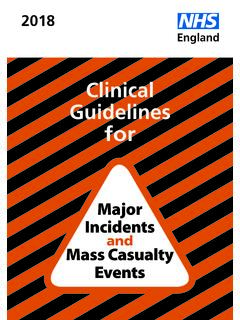Transcription of Musculoskeletal First Contact Practitioner Services
1 Musculoskeletal First Contact Practitioner Services Implementation guide Musculoskeletal First Contact Practitioner Services Implementation Guide Right person, right place, First time Contents and introduction The FCP approach Planning and development Service delivery Glossary 1 Foreword With the NHS Long Term Plan and the new GMS contract there is at long last promised significant investment in Primary and Community Care. A key aspect of this is the support to employ more than 20 000 healthcare professionals as part of the wider primary care multi-disciplinary team. First Contact MSK practitioners are a vital element of this new workforce. A significant proportion of patients present to general practice with Musculoskeletal problems. This new workforce provides an opportunity to provide early intervention for these patients and to release GPs to have time to focus on patients that need the skills of them as the expert generalist.
2 This framework will support the implementation of this promised and welcome new workforce. Suzanne Rastrick Chief Allied Health Professions Officer (England) NHS England and NHS Improvement Prof Simon Gregory DL Deputy Medical Director, Primary and Integrated Care, Health Education England Case study More than one in five GP consultations are for MSK problems. There are over one million patients seen in general practice every year and this has increase significantly over the last five years. With a falling number of GPs to meet the demand, other ways of expanding the capacity is needed to help meet the patient demand. With an ageing population and more people with long term conditions this is becoming increasingly important as demand is going to increase significantly over the next 5 years. NHS England published the Five-Year Forward View (FYFV) in 2014 which included the establishment of new model of delivering care.
3 The Hampshire became one of the Vanguard sites which were selected to test out these new models of care. One of our First initiatives was to explore how other healthcare professions could help with the capacity in general practice. We decided that MSK was a good place to start. Our hypothesis was that if we had an experience physiotherapist, who would become part of the practice team, and was able to see patients who presented with MSK problem without having to see a GP First , we could improve access for patients and provide more capacity. Our MSK Practitioner had two surgeries booked a week based in a practice. When patients contacted the practice for an appointment, they were offered the option of seeing a GP or an Musculoskeletal First Contact Practitioner Services Implementation Guide Right person, right place, First time Contents and introduction The FCP approach Planning and development Service delivery Glossary 2 MSK specialist.
4 Over a 9-month period we showed a high level of patient satisfaction with the new MSK service. Our pilot showed that the MSK specialist being present in the practice opened up lines of communications with the GPs who increased their understanding and knowledge. We showed that the cohort of patients who saw the MSK specialist were prescribed less medication, has fewer investigations and were referred less often to secondary care. Our conclusion was that basing a First point of Contact MSK Practitioner in a general practice will help with expanding the capacity and it also helps the system by reducing costs. Ultimately, I see Primary Care Networks not only having First point of Contact MSK practitioners based in practices, I also believe that this could provide a focus for delivering a much more integrated MSK service incorporating community physiotherapists.
5 Dr Nigel Watson GP and Vanguard Lead in Hampshire Chief executive Wessex Local Medical Committee. Musculoskeletal First Contact Practitioner Services Implementation Guide Right person, right place, First time Contents and introduction The FCP approach Planning and development Service delivery Glossary 3 Contents Contents and introduction Foreword .. 0 Contents .. 3 Introduction to this guide .. 4 The FCP approach Principles of FCP .. 6 What MSK FCP delivers .. 8 How FCP fits into the MSK pathway .. 9 Patient eligibility .. 11 Planning and development Stakeholder engagement .. 12 Employment and funding models .. 13 Indemnity .. 16 Skills and Capabilities of the FCP .. 17 The MSK Core Capabilities Framework .. 18 Service delivery Job grading and titles .. 19 Job planning.
6 20 Governance considerations .. 21 Facilities for the FCP .. 22 Resources for First -line interventions .. 23 Booking appointments and service promotion .. 24 Evaluating impact .. 25 Professional support and development .. 27 A day in the life of an FCP .. 28 Glossary Glossary .. 29 Acknowledgements .. 29 Developed by the CSP with contributions from: College of Podiatry, Institute of Osteopathy, Royal College of Occupational Therapists and the British Medical Association, ARMA, NASS, Versus Arthritis NHSE/I, NHS Right Care/ HEE And many individual stakeholders from the iCSP network, Primary Care teams and healthcare organisations. Health Education England (HEE) would like to thank the individuals and health systems that have contributed to the development and testing of this guide. Musculoskeletal First Contact Practitioner Services Implementation Guide Right person, right place, First time Contents and introduction The FCP approach Planning and development Service delivery Glossary 4 Introduction to this guideMusculoskeletal (MSK) First Contact Practitioner (FCP) Services position highly skilled and regulated MSK practitioners at the First point of Contact in primary care.
7 This means that a patient presenting to a GP practice with an MSK condition can see a FCP at their First appointment, accelerating their MSK assessment, treatment plan and (if appropriate) investigations and referral, along with saving both time and resources within primary care teams. As regulated MSK practitioners, FCPs work at an Advanced Clinical Practice (ACP) level. This is a level of practice characterised by a high degree of autonomy and complex decision It includes the analysis and synthesis of complex problems across a range of settings, enabling innovative solutions to enhance people s experience and improve outcomes .1 The skills and knowledge required for this role are attained through postgraduate-level MSK learning, which may include independent prescribing skills, injection therapy skills and imaging expertise.
8 1 Multi-professional framework for England (NHS HEE) 2 NHSE 2019 evaluation report Evidence demonstrating the value of FCP is growing with NHS England s evaluation of over 25,000 consultations across more than 40 FCP Common outcomes include fewer referrals into secondary care, fewer requests for imaging and improved conversion rates to surgery. Following its recent inclusion in the NHS Long Term Plan, more general practices are reaping the benefits of FCP. The transformation of the MSK pathway requires key stakeholders to work together to plan and develop FCP Services that address local patient needs and workforce challenges and maximise efficiency in the local system. This guide is intended for GPs, Primary Care Networks (PCNs), integrated care system leads, providers of Musculoskeletal Services , all clinical and non-clinical staff within primary care teams, and those involved in funding and commissioning MSK Services .
9 Musculoskeletal First Contact Practitioner Services Implementation Guide Right person, right place, First time Contents and introduction The FCP approach Planning and development Service delivery Glossary 5 It sets out the key steps to consider when implementing FCP Services with links to resources that can act as a starting point for local use. As there is no one size fits all , this guide highlights the importance of aligning your chosen approach with local objectives and needs. The guidance, data and details within this toolkit are based on hundreds of conversations, survey responses and meetings with system stakeholders, as well as information gathered from over 40 FCP Services taking part in the NHS England evaluation (2018-19). Informed by this learning and best practice, this guidance provides information to help you deliver an optimal FCP service.
10 Musculoskeletal First Contact Practitioner Services Implementation Guide Right person, right place, First time Contents and introduction The FCP approach Planning and development Service delivery Glossary Principles of FCP The core principle of an MSK First Contact Practitioner service is that the patient sees the most appropriately skilled healthcare professional, in a primary care setting, as their First point of Contact . The FCP approach is most efficient when multi-disciplinary primary care teams work together to share knowledge and, expertise, and pool resources. This helps to build strong working relationships, develop more effective Services , and avoid duplication and inappropriate referrals and interventions. The Right person: FCPs are regulated, advanced and autonomous health professionals trained to provide expert MSK assessment, diagnosis and First -line treatment, self-care advice and if required, appropriate onward referral.



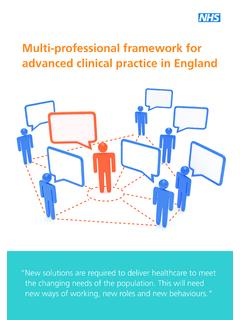

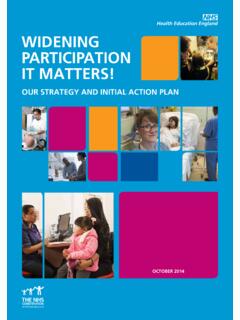

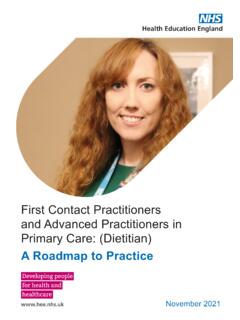
![Midlands [1 of 2] - hee.nhs.uk](/cache/preview/6/c/1/4/2/e/2/7/thumb-6c142e2790d053a442bd8a3e81c79697.jpg)

